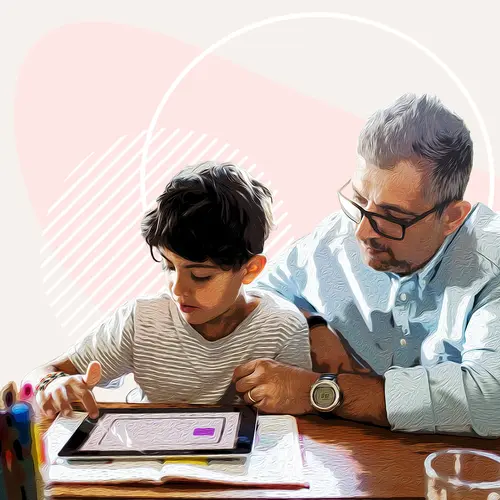You may be looking for extra support to help your child with ADHD succeed at school and home. An ADHD coach can teach kids new organization, time management, and study strategies – and give them accountability as they make changes.
If you’re thinking of hiring an ADHD coach for your child, here’s what to expect.
What Do ADHD Coaches Do?
Coaches help people with ADHD deal with common problems like planning, focus, and goal setting. The first step is to discuss what you’d like to improve in your daily life, says Sandy Maynard, an ADHD coach in the Boston area who works with teenagers and adults.
“We identify a dysfunctional behavior and then identify a healthier behavior to replace it with,” says Maynard, who contributes to ADDitude, owned by WebMD’s parent company. “We work on consistency and maintaining that to have it become a new habit, a new way of studying, a new way of performing at work, a new way of coping better with challenges.”
Maynard recommends coaching for kids ages 13 and older. By then, she says, “they’re more apt to be able to take ownership for goals they set for themselves [for] that week,” she says.
Coaches can also work directly with parents -- including those of younger children -- to help them set structure, habits, and routines in the family, Maynard says.
While ADHD coaches can be valuable to give kids accountability, they should also help their clients develop individual responsibility, says psychologist Laura Anthony, PhD, of Children’s Hospital Colorado and the University of Colorado School of Medicine.
“It can be a really great thing if they are trying to build new skills and not just sitting over the kid while they do what they’re supposed to do,” Anthony says. “I really believe that you need to build those independence skills early on.”
What Should I Look for in an ADHD Coach?
If you’re working with a therapist, psychologist, or psychiatrist, ask them for recommendations.
To find out if an ADHD coach is a good fit, ask questions such as these:
- What experience do you have working with this age group?
- What ADHD training and certification do you have?
- What books do you recommend about ADHD?
- What’s your educational background?
Training varies widely for ADHD coaches, who can be life coaches or mental health professionals. Some credentials you can look for are certification by the International Coaching Federation and the ADD Coach Academy, Maynard says.
ADHD coaches who are former teachers and educators often understand the demands of school and can help kids succeed there, Anthony says.
“I think you’re going to want to see the effects at school,” she says. “The effects of school failure or having trouble at school can really have a lifetime effect. Avoiding education or careers that require that kind of sustained attention can start a real negative spiral.”
Is My Child a Good Fit for ADHD Coaching?
“Certainly coaching is only one intervention,” Maynard says. “The medication piece and therapeutic piece always come first.”
To be prepared for coaching, kids should be motivated to make changes, Maynard says. “They’re ready to do the hard work that is needed to be better organized or to manage their time better and they’re also willing to take full responsibility for the decisions that they make.”
Conditions such as anxiety and depression are common for people with ADHD. Those issues should be addressed and under control before coaching can succeed, Maynard says.
“When a kid is really so resistant to change because they feel so bad about themselves, that is a time to start with therapy, not coaching,” Anthony says. “A kid who is asking for help is a great candidate for a coach. But for a kid who is really shut down, sad or overwhelmed with anxiety, you really need to take care of those emotions first.”
How Often to Meet With a Coach, and What Does It Cost?
Coaches often meet with clients weekly. Sessions are often available in person, over video calls or on the phone. Some coaches may check in over text or email. Some parents like to be at every appointment with their kids, and others just attend the first meeting, Maynard says.
The price of ADHD coaching varies, but it should cost about what therapy does in your area, Maynard says. One estimate is $300-$600 a month, she says. Coaches can charge by the month according to the coaching plan you agree upon together, or by the hour or partial hour. They sometimes require an upfront payment or retainer for future services, Anthony says.
The main drawback to coaching is that it’s expensive – and not typically covered by insurance, Anthony notes. “It’s a great model for the people who can afford it, but that’s a limited number of people,” she says.
If coaching doesn’t fit into your family’s budget, Anthony recommends that you look first to your school for extra support or services to help your child. Also, therapists can sometimes provide similar goal-oriented services while being covered by insurance, she says.
What Are the Benefits of ADHD Coaching?
ADHD coaching can help with everyday issues like making school mornings less hectic, improving kids’ money management, and smoothing communication between parents and children, Maynard says.
If coaching is working well, your child should feel positive and confident. “Kids should be talking about meeting their own goals, they should be talking about their successes, and they should be feeling more motivated,” Anthony says. “The parents should be able to back off from being teacher, coach, and parent, to be more like just parents. If they’re not feeling that, it’s a good time to reevaluate the plan.”

